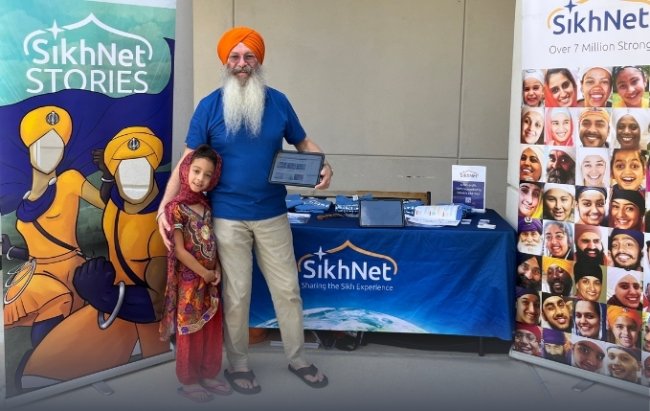| Goodbye Mandela |
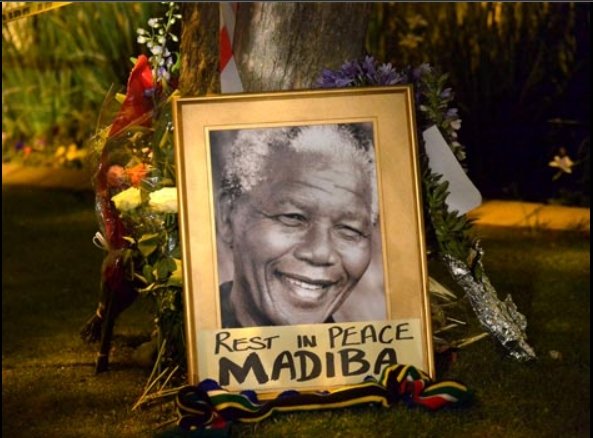 |
| SourceThis picture shows a framed image of former South African president Nelson Mandela as people pay tributes following his death, in Johannesburg (AFP) |
December 06, 2013: The death of global anti-apartheid icon and South Africa's liberation leader Nelson Mandela has unleashed a chorus of awed respect from across the worlds of politics, religion, sport and culture.
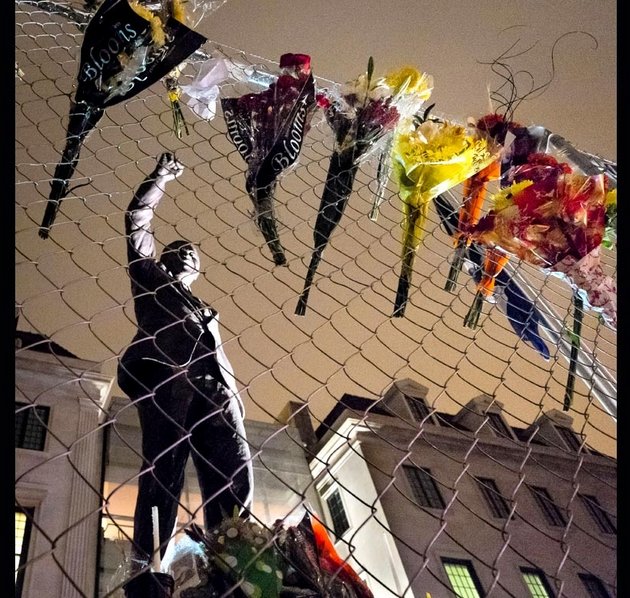 |
| Flowers left in tribute to former South African president Nelson Mandela hang on the construction fencing in front of a statue of Mandela at the South African Embassy before daybreak ... |
Statesmen, resistance leaders, Nobel laureates and prisoners of conscience have died before, but never has one man united such global unity in honoring his passing.
Very few people become global icons whose passing can dominate all of the world's front pages, trigger non-stop TV coverage and invite worshipful plaudits from across the media landscape. Nelson Mandela was one. The journey 1918-2013
The 95-year-old's death late on Thursday also generated an outpouring of emotion across Twitter and other social media, demonstrating a fitting sense of global unity in praise for the anti-apartheid hero whose struggle for equality in South Africa inspired billions.
Mandela will be buried on Sunday, December 15 at his rural home in Qunu, and a memorial service in a Johannesburg stadium will be held on Tuesday, December 10, president Jacob Zuma announced.
His body will lie in state at government buildings in Pretoria from Wednesday, December 11, until the burial, and this coming Sunday, December 8, will be a national day of prayer and reflection.
Mandela was hospitalised in June with a recurring lung infection and slipped into a critical condition, but returned home in September where his bedroom was converted into an intensive care unit.
World leaders queued up to issue solemn tributes to the 95-year-old anti-apartheid hero who became South Africa's first democratic president.
"He no longer belongs to us; he belongs to the ages," Barack Obama, America's first black president, said in a deliberate echo of an early tribute paid to Abraham Lincoln, the president who emancipated the slaves.
In a rare tribute for a foreigner, Obama ordered US flags at the White House and other public buildings flown at half-mast until Monday.
Over and over, leaders returned to the dignity Mandela displayed during his long imprisonment by South Africa's former racist regime and then later, when he led his country to majority rule.
United Nations Secretary General Ban Ki-moon declared Mandela a "giant for justice."
"Many around the world were influenced by his selfless struggle for human dignity, equality and freedom. He touched our lives in deeply personal ways," he said.
Britain's Queen Elizabeth II sent her personal condolences to Mandela's family, saying she "remembers with great warmth" her meetings with a man who "worked tirelessly for the good of his country."
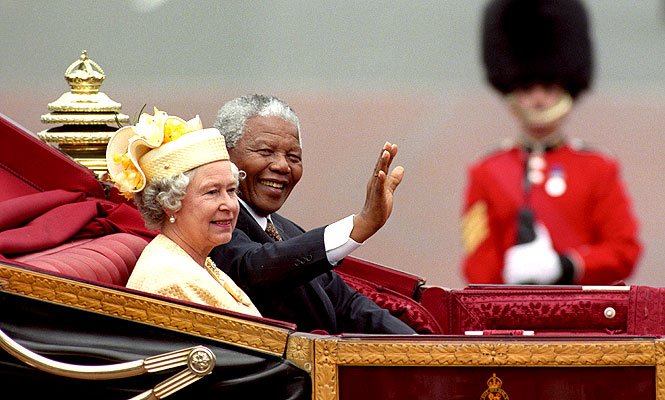 |
| A July 9, 1996 file photo of Nelson Mandela, former president of South Africa, and Britain's Queen Elizabeth II riding in a carriage along the Mall, London. (AP Photo) |
Prime Minister David Cameron, who in 2006 apologized for what he said were the "mistakes" of his Conservative Party in its response to apartheid in Britain's former colony, said: "A great light has gone out in the world."
French Prime Minister Jean-Marc Ayrault, in China on an official visit, said Mandela would "long be an inspiration to all of humanity" as his government also ordered flags to fly at half-mast.
India's Prime Minister Manmohan Singh hailed the anti-apartheid icon as a "true Gandhian" who would continue to inspire future generations after his death, while Nigeria's President Goodluck Jonathan dubbed Mandela "one of mankind's greatest liberators."
The Indian government announced a five-day state mourning as a mark of respect to Mandela.
A decision to this effect was taken at a special meeting of the Union Cabinet, which condoled the death of the anti-apartheid icon. "Mandela was the tallest leader of not only his generation but possibly this entire paradigm. The role that he personally played in dismantling the apartheid is something exemplary," information and broadcasting minister Manish Tewari said after the meeting.
Russian President Vladimir Putin recognised Mandela as "one of the greatest politicians in modern times" and a man who never betrayed his convictions.
And Israel's leaders recognised him as a champion of peace despite his tireless advocacy of the Palestinian cause.
Retired political figures who remembered Mandela during his 27 years of imprisonment or worked with him after his 1990 release were also effusive.
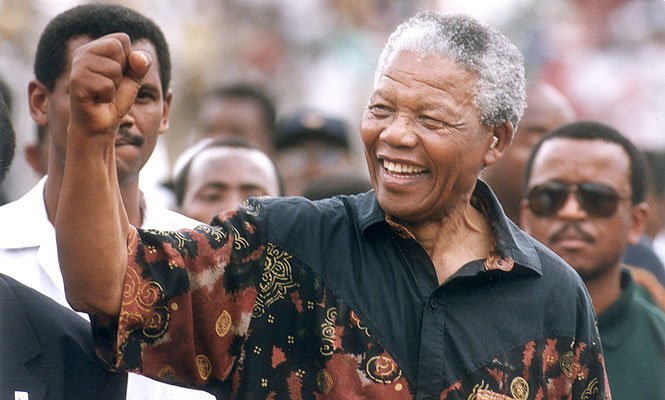 |
| This file photo from 1994 shows Nelson Mandela waving to his supporters. (AP Photo/The Star Tribune, Jerry Holt, File) |
Former US president Bill Clinton tweeted a picture of himself with his "friend," and said: "Today the world has lost one of its most important leaders and one of its finest human beings."
"Over the past 24 years Madiba taught us how to come together and to believe in ourselves and each other. He was a unifier from the moment he walked out of prison," said Archbishop Desmond Tutu.
In his home country, most newspapers published their headlines in black, in a reflection of the deep sense of loss brought by the death of "Madiba", a father figure to millions of South Africans.
"The World Weeps," said the national daily The Star.
Around the globe, news channels offered rolling coverage while many newspapers and weekly magazines deployed the kind of souvenir front pages that would usually greet the death of a monarch or national hero.
The cover of The New Yorker featured the image of a young Mandela raising his fist with typical defiance and dignity, while Time magazine chose a more recent photo with the caption: "Protester. Prisoner. Peacemaker."
"The alchemy of character and events made of Mandela a peculiarly unspotted figure," wrote Britain's The Guardian in an editorial.
"Few could deny a certain sweetness in his personality, and a largeness of mind that had room for all."
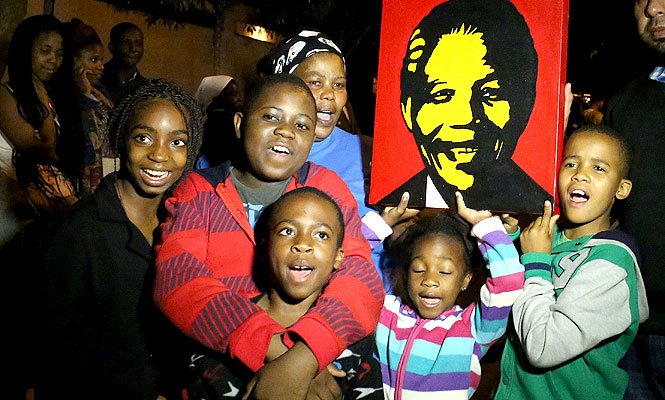 |
| South Africans hold pictures of former South African president Nelson Mandela as they pay tribute following his death in Johannesburg. (AFP Photo) |
Mandela spent 27 years in jail for his battle against white-supremacist rule, before being elected in South Africa's first all-race elections in 1994 and reconciling with his former oppressors.
His death had long been expected, coming after a spate of hospitalisations with lung infections and three months of intensive care at home. But the announcement sent a shockwave around the world nonetheless.
Britain's Daily Mail described Mandela as a "colossus" and "a giant who taught the world the meaning of forgiveness", joining other British newspapers for whom news of Mandela's death broke just in time for front-page redesigns.
Spain's leading daily El Pais dedicated its first 13 pages to the story, leading with "The man who defeated racism" on its front page above a photo of him with his closed fist raised to his forehead.
The online edition of Germany's Der Spiegel hailed Mandela as "one of the greatest fighters against oppression" while Berlin daily Taggespiegel carried "Death of a legend" as its headline.
In France, sports newspaper L'Equipe noted Mandela's influence and example on athletes around the world, given how he used sport as a force for national reconciliation at the 1995 Rugby World Cup.
While paying fulsome tribute, Sweden's Dagens Nyheter sounded a note of criticism in an editorial: "It would have been desirable that Mandela had spoken about the abuses in neighbouring Zimbabwe and South Africa's clumsy handling of the problems with (Robert) Mugabe."
This picture shows a framed image of former South African president Nelson Mandela as people pay tributes following his death, in Johannesburg. (AFP Photo)
For many, Mandela's death was very much a social media event with Twitter and Facebook ablaze with shared stories, reflections and comments that took the story into a more personal domain.
"I learned of the news on Twitter and shared it on Facebook. It's a normal routine for people in this day and age," said Yuen Chan, lecturer at the School of Journalism and Communication at The Chinese University of Hong Kong.
News of Mandela's death broke too late for many of Asia's newspapers to carry in their print editions. But Hong Kong's South China Morning Post and others splashed the news across their websites.
When it comes to major news events of this magnitude "there is something about having that front page in your hand, holding something physical", Chan said.
"But I'm not sure if that really applies to young people, whether they have that attachment to it."
Regardless of the format, Mandela's legacy struck a universal chord, she said, prompting a global media response of rare scale.
The Onion, a US purveyor of mock news, laced its regular shots of satire with regret at the South African hero's passing. Its headline said: "Nelson Mandela Becomes First Politician To Be Missed."
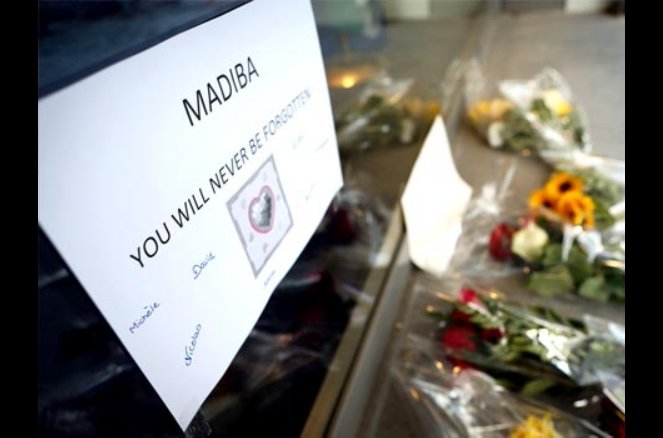 |
| A note reading "Madiba, you will never be forgotten" and flowers are layed on the ground at the South African Embassy in Brussels. (AFP) Source |
---------------------------------
Further Reading:
The private heartache of public hero Nelson Mandela
Mandela: prisoner, president and father of 'Rainbow Nation'
With Mandela gone, South Africa may become vulnerable to racial tension
In pics: Mandela's Indian connect
Remembering Madiba, all steel and gentleness
---------------------------------
PRESS RELEASE:Nelson Rolihlahla Mandela
In appreciation….
It is rare for me to be able to combine so many passions of collecting, sport (boxing, soccer & adidas) and humanitarian & charitable causes, but I am humbled to do so through the legacy of Nelson Rolihlahla Mandela or simply Madiba as he affectionately liked to be called.
Much has and will be written about Nelson Mandela over the next several weeks leading up to his State Funeral. I would like to share the journey of my appreciation and admiration for Nelson Mandela leading to the pinnacle of my country, my faith and my community.
I have been on the path of social justice, human rights and humanitarian & charitable causes for close to 30 years. I do recognize that it is a life time commitment, a path that has no end, but driven by a hope towards an end.
I am reminded of a quote by George Bernard Shaw that speaks to Nelson Mandela's spirit: "…I am of the opinion that my life belongs to the whole community, and as long as I live it is my privilege to do for it whatever I can.
I want to be thoroughly used up when I die, for the harder I work the more I live…"
Mandela lived for the community, he lived for the people, he was the people's leader, he was the people's president, he was the country's son, he was Madiba. So much so that when he told, Mr. Mandela, you are free, he aptly replied, I am not free until my people are free!
This is what keeps me inspired , motivated and going.
Nelson Mandela came to Canada three times. In 2001, Nelson Mandela was the first living person to be bestowed as a Honorary Canadian Citizen, I am proud as a Canadian to have Nelson Mandela as a fellow citizen and the "honour" truly rests with us. I remember being so excited that I drove downtown to express publically my great joy in hearing this news. I entered the City TV/Much Music speakers corner booth, put my money in the slot and shared my best wishes to all. To my further surprise, it was played on the air! In 2001, Nelson Mandela was also honoured with the renaming of Park Public School, to Nelson Mandela Park Public School in Toronto, with the Toronto District School Board, for whom I currently work.
I have two separate occasions to be in the presence of Nelson Mandela. During Nelson Mandel's visit to Canada in 1998, I got the opportunity to be in the presence of Nelson Mandela with thousands of children at the Skydome (now Rogers Centre) when he shared a passion speech about his journey. That wasn't enough and I found an opportunity to have a even more intimate presence with Nelson Mandela Saturday November 17th, 2001 when Nelson Mandela and wife Graca Machel received their Ryerson honorary degrees at Ryerson University.
South Africa's apartheid regime designated Mandela's African National Congress (ANC) as a terrorist organization for its battle against the nation's legalized system of racial segregation that lasted from 1948 to 1994. Former U.K. Prime Minister Margaret Thatcher also described Mandela's ANC as a "typical terrorist organization" in 1987, refusing to impose sanctions on South Africa's apartheid regime. President Ronald Reagan did as well. In fact, Mandela remained on the U.S. terrorism watch list until 2008.
All of the above may point to why Nelson Mandela chose Canada as one of the first countries he visited after his release in 1990.
When I look back at historic figures such as Martin Luther King, I sometimes wonder how powerful would it have been if he spoke at a Gurdwara - a Sikh place of Workship. How even more powerful would it have been to have a Statesman the calibre of Nelson Mandela during my lifetime speak amongst my faith community.
To my surprise and astonishment, this event did take place. I was in South Africa, Durban to be exact, in 2001 attending the UN World Conference against racism with some friends and colleagues. As I stayed behind, one of my friends Bindu Dhaliwal (a Canadian pioneer in her own right), decided to go to J Berg (Johannesburg) and visit Mr. Mandela's house as well as his prison on Robin Island. Bindu took several pictures of her visit, and she told me she has one special one for me. It was of a framed letter commemorating Nelson Mandela's visit to Canada and more specifically to the Ontario Khalsa Darbar (Dixie Gurdwara) dated June 18, 1990. It read as follows:
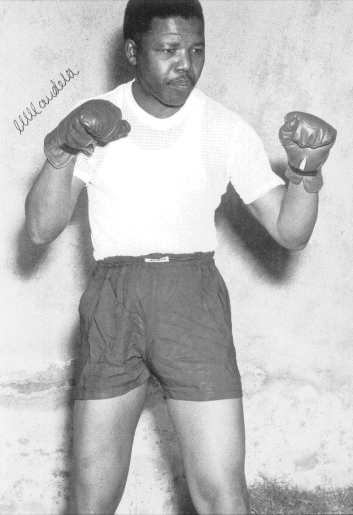

Presented to
Nelson Rolihlahla Mandela
On his visit to Toronto, Canada
June 18, 1990
By the Sikh of Canada in appreciation
for his continued resistance against
apartheid in South Africa and racism
in the world
Ontario Khalsa Darbar
7080 Dixie Road
Mississauga, Ontario L5S IB7 Canada
WOW. I couldn't believe me eyes. Not only did Nelson Mandela speak to the Sikh congregation, the congregation in turn fundraised thousands of dollars to support Mandela and the ANC in his bid to become president of a free and democratic South Africa.
This image now forms part of the archives and collections of the Sikh Heritage Museum of Canada www.shmc.ca, and is one of the many great stories of the history of Sikhs in Canada.
The author is the Executive Director for the Sikh Heritage Museum of Canada and a Historian, Researcher, Collector and Curator of various Sikh Heritage Exhibits. He is also a former boxer.
Pardeep Singh Nagra
76 Bankview Cirlce
Toronto, Ontario
M9W 6S4
416-587-5498
